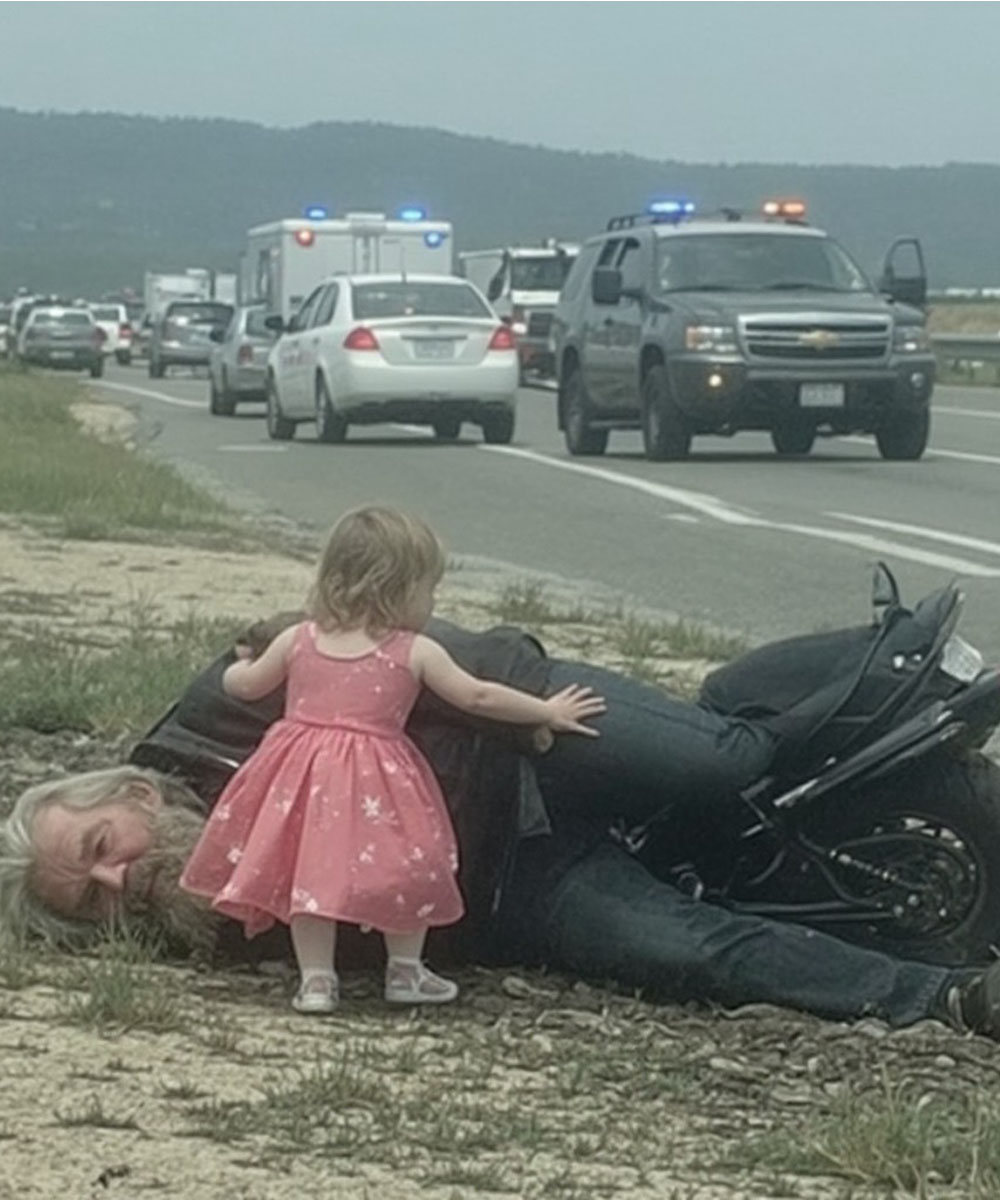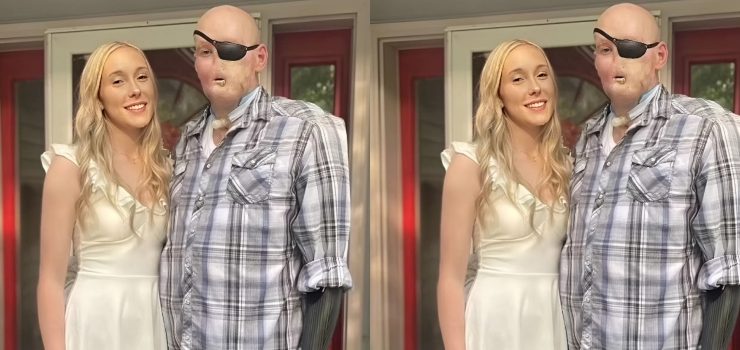On a late autumn afternoon along Route 27 outside Ashford, traffic moved as it always did, but in the backseat of a family car a five-year-old girl in a glittering princess gown began to thrash against her seatbelt, screaming at her mother to stop. Her name was Sophie Maren, a small child with tangled blonde hair, light-up sneakers, and a stubbornness far larger than her frame.

She sobbed and insisted that “the motorcycle man” was dying down below the ridge, even though from the road there was no wreckage, no smoke, no hint of an accident. Her mother Helen thought Sophie was simply overtired from kindergarten, but when the child tried to unbuckle herself and kept repeating details—“the man with the leather jacket and beard” was bleeding—Helen reluctantly pulled over. Before the car had stopped, Sophie darted out, her princess dress flying, and raced down the embankment. Helen followed and froze at what she saw: forty feet below lay a huge man beside a twisted Harley, his chest slick with blood, his breaths shallow and rattling. Without hesitation Sophie slid down the slope, tore off her cardigan, and pressed both small hands against the worst wound. “Hold on,” she whispered, “I’m not leaving. They told me you need twenty minutes.”
Shaking, Helen dialed emergency services, but could not understand how her daughter knew how to tilt the man’s head to clear his airway and apply pressure with calm authority. When Helen asked, Sophie murmured, “From Isla. She came in my dream last night. She said her father would crash and I’d have to help.” The biker was Jonas “Grizzly” Keller, who had been shoved off the road by a pickup while riding home from a memorial run. He had already lost dangerous amounts of blood, but Sophie knelt in her princess dress, singing softly and keeping steady pressure.
By the time paramedics arrived, a crowd had gathered. When medics tried to move Sophie aside she refused, saying she would not leave until his brothers came. Then the low thunder of motorcycles filled the air as dozens of bikers crested the rise and braked in unison. The first man, a towering figure with “IRON JACK” stitched across his vest, went pale when he saw Sophie. “Isla?” he whispered. Isla Keller, Jonas’s daughter, had died of leukemia three years earlier before she turned six, remembered by the club as their little angel who once sat proudly on chrome tanks during parades. Sophie looked up and replied, “I’m Sophie.
But Isla says to hurry. He needs O-negative, and you have it.” Stunned, Iron Jack allowed the paramedics to draw his blood for an immediate transfusion. Jonas stirred briefly, his eyes locking on Sophie, rasping the name “Isla.” Sophie bent closer and said softly, “She’s right here. She just borrowed me for a while.” The bikers formed a chain to move Jonas to the ambulance. Only once the doors shut did Sophie release her grip, standing small and trembling in bloodstained sequins as hardened men looked at her with awe. Doctors later confirmed Jonas survived only because someone had immediately applied pressure to a major artery.
They could not explain how a child knew precisely what to do or how she spoke of details like blood type and songs only Isla would have known. Sophie simply said, “Isla showed me.” The Black Hounds Motorcycle Club embraced Sophie after that day. They filled the seats at her school recital in full leather, created a scholarship in Isla’s name for her future, and placed her proudly on their bikes during parades, promising one day she could ride for real. Yet the most chilling confirmation came six months later when Sophie visited Jonas’s backyard and stopped at an old chestnut tree. “She wants you to dig here,” she said.
Beneath the soil lay a rusted tin box holding a note in a child’s scrawl, unmistakably Isla’s. It read, “Daddy, the angel told me I won’t grow up, but one day a little girl with yellow hair will come. She’ll sing my song and save you when you’re hurt. Please believe her. Don’t be sad—I’ll be riding with you forever.” Jonas collapsed in tears, while Sophie put her arms around him and whispered, “She likes your red bike. She always wanted you to have one.”
He had secretly bought a red Harley a week before the crash, red being Isla’s favorite color. Word of the miracle child spread quickly, dismissed by some as coincidence but held as sacred truth by those who had been there that day. They saw a little girl in a princess dress, carrying the voice of a child lost too soon, holding death at bay with her bare hands. Sometimes angels do not arrive with wings but with flashing sneakers and sequined gowns, and sometimes they speak through those willing to listen.
Jonas still rides with the club, engines roaring beneath the sun, and he swears he feels tiny arms around his waist when he does. Sophie, now older, only smiles and says, “She’s riding with you today, isn’t she?” And Jonas answers without hesitation, “She always is.”





